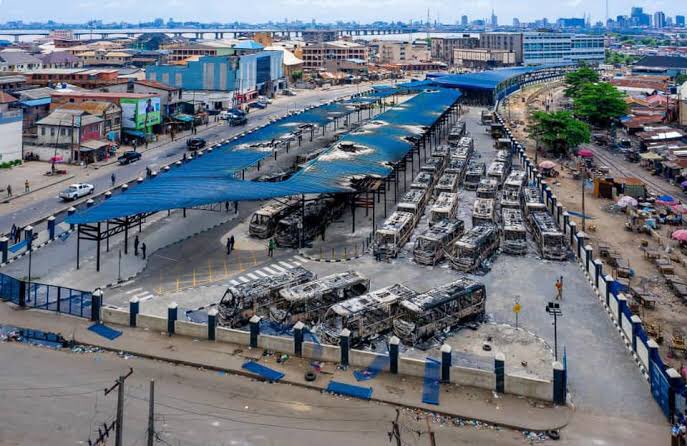By Akeem Lasisi

Four years after Nigeria witnessed the emphatic protests called #ENDSARS, scars of its fallout are still disturbingly visible in Lagos’ memory. Like a recurrent ugly decimal, the ghost of the anti-police brutality action that started well but ended sourly remains a despotic visitor based on the nasty experience it bequeathed to the state. As a result, like the proverbial old eye that has witnessed a bush-fire and thus dreads shortcuts, the ‘Centre of Excellence’ gets unsettled hearing vibes of any angry gathering.
No wonder, many Lagosians were among the first to express concern about the hardship national protest being planned for 1 to 10 August. From different strata — business community, markets, workshops, schools and neighbourhoods — opposition to the action has been strident. All of a sudden, the Lagos that used to be the first to jump forward for such a national battle is being very cautious because it fears any kind of eventuality.
Ironically, although many residents feel reluctant about the protest, they are not immune to the harsh pains that other parts of the country are experiencing, as occasioned by the reforms being carried out by the Federal Government. It only fears that double jeopardy might become its lot if anything goes wrong again. Since last year that the economic challenges turned tougher, the Babajide Sanwo-Olu government has been introducing some measures to cushion its effects. These include reduction in BRT fare, grants to some vulnerable groups, including market women; salary and bursary top-up as well as selling of food items at reduced prices, aka Ounje Eko, which was on for some Sundays. The fact, however, is that the inflationary storm has not abated.
Yet, as the understandable but controversial protest draws nearer, many stakeholders keep arguing that it should not make Lagos the epic centre. They say apart from the fact that Abuja is the federal capital, every other state/governor should be made to hear the voices of the protesters because neither Sanwo-Olu nor even Tinubu is expected to solely engineer the needed succour. More importantly, those scared by scars of the #ENDSARS fallout say Lagos should no more be made the scapegoat. They are quick to recall the widespread destruction it witnessed in 2020.
A new official video is, in this wise, reminding all and sundry about why no form of violence should again be contemplated or allowed in the state, as it lists the major facilities that were hit by hoodlums that hijacked the cause. Titled ‘Never Again in Lagos’ (Aftermath of ENDSARS protests in Lagos), it lists and displays pictures of many assets vandalised or burnt down. These include government buildings, hospitals, several police stations, many BRT buses, bank buildings, shopping malls, palaces —including that of the Oba of Lagos — and TVC headquarters. With such a sad memory lingering, it is not surprising that voices of dissent are loud as far as the August action is concerned.
But what about residents who also want to genuinely protest against the hardship and do not have any sinister motive as some people are being suspected of? Don’t they have the right to protest? Constitutionally, they do, especially in a democracy, even if the police and some other government officials insist some approval is required. Interestingly, Sanwo-Olu too has acknowledged the right of such people to protest. He is, however, repeatedly preaching caution. Amid the arguments heralding the protest, a group, days ago, declared that an Oro cult festival would hold between August 1 and 15. This raised further clouds and suspicion but the state government has dissociated itself from it, noting that those involved were just like any other religious group observing their own programmes.
Most importantly, the governor has assured that the freedom and security of everyone is guaranteed. In a statement by his Special Adviser on Media and Publicity, Gboyega Akosile, he emphasised that the state government was open to dialogue and a peaceful resolution of issues. The governor acknowledged the constitutional rights of citizens to voice their concerns about the socio-economic situation in the country but warned against actions and utterances that could endanger public safety and peace. According to him, some individuals issuing threats might have ulterior motives aimed at disrupting law and order.T
He lauded the President Bola Tinubu-led administration for its commitment to addressing citizens’ grievances through dialogue, emphasising the need for continuous engagement for the sake of national stability and the strengthening of democratic governance.
He said, “We are at a point in the country where there have been agitations and plans for nationwide protests. It is crucial to recognise the constitutional rights of citizens to express sincere concerns. As leaders, we must appreciate these concerns but also ensure that protests do not become a platform for advancing political agendas. Divisive rhetoric and actions should be avoided.
“The current administration, which has been in office for less than 15 months, is dedicated to transforming the country’s economic fortunes. The government is actively engaging with citizens to address their grievances and demonstrate its commitment to listening. It’s essential that all grievances are brought to the table for resolution. This openness to dialogue is a testament to the government’s sincerity in addressing issues as they arise”.